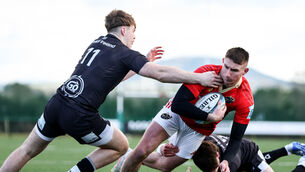Dawson: boycott ‘catastrophic’ for Irish game
“It will be very serious for Irish teams in the short term,” Dawson said last night. “It will be the same for all of us; there will be no exceptions for the Irish teams, all of whom have to work within a specific budget from year to year.
“For instance, there are five particular games every year, the three guaranteed Heineken Cup matches and the ties against Ulster and Munster, from which we earn a lot of our income. The potential loss of Heineken Cup games would be a huge blow. Then, of course, our sponsors have built-in penalty clauses in the event of not competing on the big stage.”















